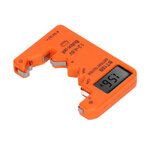dragosios
Newly Enlightened
Any measuring instrument is as good as the user knowledge. It shows a value, but it's up to the humans to understand what this value mean.
As for measurements ... yes, a cheap multimeter is better than nothing. But the difference between a 3% plus some digits of a cheap multimeter and some very expensive ones with 6+ digits can be put to good use when measuring something important, designing things and so on. Such a multimeter is very expensive, it needs warm up time, even cheap cables can make a difference, so this is not something for daily use.
Overall, for somebody with enough knowledge, a cheap multimeter is enough if it works. But cheap multimeters are not so durable, during time they can have different problems even leading to errors, which again can be detected given enough knowledge.
A voltage tester, on the other hand, gives more reliability because is not so complex (when it comes to user interface) and probably even more durable since the error is not huge to be shown anyway. When you have 3-5 LED's as display, a 3% error is unlikely to show frequently..
P.S. A specific resistor in paralel with multimeters input is doing the same thing as a tester, just not as automated. Some analog multimeters have a lower impedance than modern digital ones and can be more accurate.
As for measurements ... yes, a cheap multimeter is better than nothing. But the difference between a 3% plus some digits of a cheap multimeter and some very expensive ones with 6+ digits can be put to good use when measuring something important, designing things and so on. Such a multimeter is very expensive, it needs warm up time, even cheap cables can make a difference, so this is not something for daily use.
Overall, for somebody with enough knowledge, a cheap multimeter is enough if it works. But cheap multimeters are not so durable, during time they can have different problems even leading to errors, which again can be detected given enough knowledge.
A voltage tester, on the other hand, gives more reliability because is not so complex (when it comes to user interface) and probably even more durable since the error is not huge to be shown anyway. When you have 3-5 LED's as display, a 3% error is unlikely to show frequently..
P.S. A specific resistor in paralel with multimeters input is doing the same thing as a tester, just not as automated. Some analog multimeters have a lower impedance than modern digital ones and can be more accurate.


